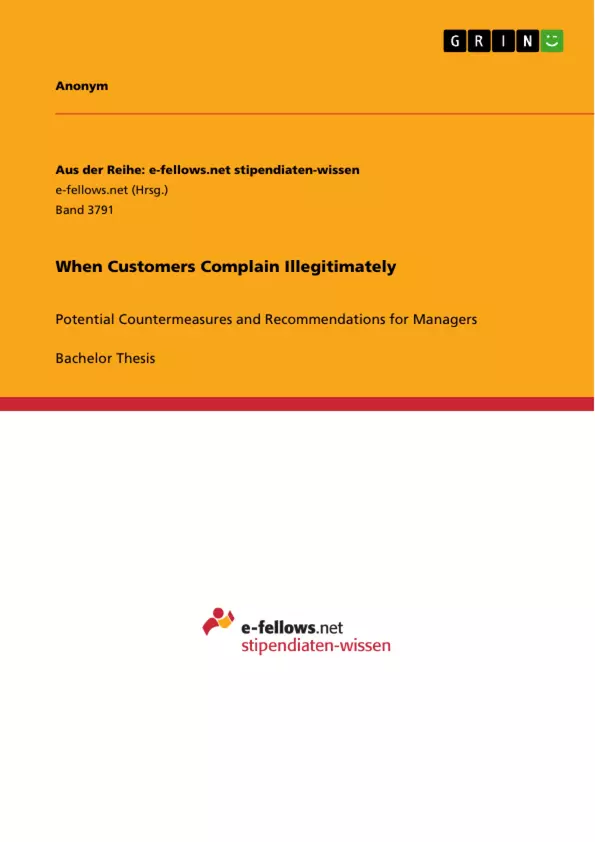This thesis provides an extensive overview of the recent literature on illegitimate customer complaints, offering relevant insights and recommendations for managers. In recent times, illegitimate customer complaints have become an increasing problem for companies in various industries. In these cases, customers voice complaints, although no actual problem has occurred. Nevertheless, best practice guidelines for dealing with this type of complaint that are based on scientifically substantiated evidence are still hard to find.
Specifically, this thesis identifies an increasing customer orientation, generous return policies, and changes in the technological environment as the main drivers facilitating illegitimate complaints. The influence of other factors on illegitimate complaining behavior, such as the “domino effect” as a situational factor, is also highlighted. With additional consideration of the motives of complainers (where a distinction can be made between fraudulent returners, freeloaders, fault transferors, peer-induced esteem seekers, solitary ego gainers, and disruptors), countermeasures are derived. The empowerment of employees, inter alia, through an increase of their responsibility, the implementation of complaint databases and complaint management systems, and the revision of the existing service culture and return policy, were identified as the most effective counter-measures to the negative impacts of illegitimate complaints.
Inhaltsverzeichnis (Table of Contents)
- Relevance of Illegitimate Customer Complaint Handling for Companies
- Theoretical Foundations of Customer Complaints
- Definition of Legitimate Complaints
- Definition of Illegitimate Complaints
- Literature Review on Illegitimate Customer Complaints
- Factors Facilitating Illegitimate Complaining
- Impact of Situational, Habitual, and Personal Factors
- Motives for Illegitimate Complaints
- Fraudulent Returners
- Fault Transferors
- Freeloaders
- Peer-induced Esteem Seekers
- Solitary Ego Gainers
- Disruptors
- Impact and Effects of Illegitimate Complaints on Companies
- Consequences for Employees in Customer Contact
- Financial Costs of Illegitimate Complaints
- Potential Countermeasures
- Employee Training and Empowerment
- Implementation of Databases and Customer Complaint Management Systems
- Revision of Existing Return Policies
- Discussion
- Critical Evaluation
- Contribution to Customer Complaint Management and Practice
- Limitations and Future Research
Zielsetzung und Themenschwerpunkte (Objectives and Key Themes)
This thesis aims to provide a comprehensive overview of the recent literature on illegitimate customer complaints, offering relevant insights and recommendations for managers. It seeks to address the growing problem of customers lodging complaints despite the absence of a genuine issue. The thesis highlights factors contributing to illegitimate complaints, examines the motives behind them, and explores their impact on companies.
- Factors Facilitating Illegitimate Complaints
- Motives for Illegitimate Complaints
- Impact of Illegitimate Complaints on Companies
- Effective Countermeasures for Addressing Illegitimate Complaints
- Implications for Customer Complaint Management and Practice
Zusammenfassung der Kapitel (Chapter Summaries)
Chapter 1 establishes the relevance of illegitimate customer complaints for companies. It highlights the growing prevalence of such complaints and their potential negative impact on businesses. Chapter 2 provides theoretical foundations for understanding customer complaints, defining legitimate and illegitimate complaints and outlining their characteristics.
Chapter 3 delves into the existing literature on illegitimate customer complaints. It examines the factors facilitating illegitimate complaining behavior, including increasing customer orientation, generous return policies, and technological advancements. It also explores the influence of situational, habitual, and personal factors on complaining behavior. The chapter further investigates various motives behind illegitimate complaints, such as fraudulent returns, fault transfers, and the pursuit of social or personal gains.
Chapter 3 concludes by analyzing the consequences of illegitimate complaints for companies, focusing on the impact on employees and the financial costs. It then proposes a range of countermeasures, including employee training and empowerment, the implementation of databases and customer complaint management systems, and revisions to existing return policies.
Chapter 4 engages in a critical evaluation of the findings and discusses their contributions to customer complaint management and practice. It also identifies limitations of the research and suggests avenues for future investigation.
Schlüsselwörter (Keywords)
The primary focus of this thesis is on illegitimate customer complaints, their contributing factors, and their impact on companies. Key concepts explored include customer orientation, return policies, technological advancements, motives for complaining, employee empowerment, complaint management systems, and the financial consequences of illegitimate complaints.
Frequently Asked Questions
What are illegitimate customer complaints?
Illegitimate complaints are voiced by customers even though no actual problem or product defect has occurred.
What drives the increase in illegitimate complaints?
Main drivers include increasing customer orientation, very generous return policies, and advancements in technology.
What are the common motives for complaining illegitimately?
Motives vary from fraudulent returning and freeloading to fault transferring and seeking peer-induced esteem.
How do illegitimate complaints affect employees?
They can lead to high stress, decreased morale, and negative emotional impacts for frontline service staff.
What countermeasures can companies take?
Effective measures include employee empowerment, implementing complaint databases, and revising service cultures and return policies.
- Arbeit zitieren
- Anonym (Autor:in), 2020, When Customers Complain Illegitimately, München, GRIN Verlag, https://www.grin.com/document/1002094



